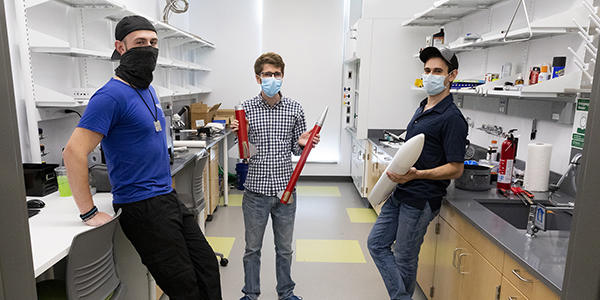Undergrads set their sights on space

A team of undergraduates aims to elevate Binghamton University’s stature by sending a rocket into space.
Seniors Jacob Goodman, Alex Blumenthal and Jeremy Gendler are leading the effort, dubbed AeroBing.
They aim to send a rocket past the Kármán line, the international boundary between Earth’s atmosphere and outer space. It’s 100 kilometers — or 62 miles — above Earth’s mean sea level.
Only one school, University of Southern California, has managed to do it so far.
“We’d like to be significantly past the Kármán line, such that we are certain that we were in space,” says Goodman, the project lead. “And by doing that, we would achieve certainty that we were in space and beat the altitude record as well.”
In short, says Gendler: “We’re going to shatter their record.”
The group is working to see if it can have military radar track the rocket’s progress. Guinness World Records may also take an interest.
“The burning question for us is not what’s up there,” Gendler says. “It’s what we’re capable of.”
Goodman, Blumenthal and Gendler have been working on the project for nearly a year, and they bring lots of backyard rocket experience to the endeavor.
“As a kid, I was always doing all sorts of rocketry stuff, launching model rockets,” says Gendler, a Chicago native and chief engineer on the project. “My mom would buy me a kit, and I didn’t want the kit. I wanted to build my own rocket.”
After a family friend who was an Israeli flight engineer came for a visit, Gendler says, he became downright obsessive about building airplanes and launching rockets.
“I went to my local synagogue and asked if they would clear the parking lot for me because I was launching to the moon,” he recalls. “I was indulged by the administrators, but you can imagine that the launch from the South Side of Chicago didn’t happen.”
In the summer before his junior year at Binghamton, Gendler was walking on campus with a friend. He remembers telling him, “Listen, you know what? By the time I’m 25, I want to put something into space.”
So, he says, it felt a bit like destiny when Goodman, a fellow mechanical engineering major from New Rochelle, approached him about the project.
Goodman enjoyed a few minutes of fame early in the pandemic when he built a prototype of a ventilator in his dorm room one weekend using parts he found at Wal-Mart. He has been friends with Blumenthal since they were roommates during their first year at Binghamton.
Blumenthal, a chemistry and materials science major from Easton, Pa., took his first flight lesson when he was about 10 years old and recently earned his pilot license.
He says the team doesn’t have a launch date yet but expects it will be in late spring 2021. Until then, says Blumenthal, chief operating officer for the project, AeroBing will be building and testing many smaller rockets.
“To figure out, OK, does this system work? Are we getting the accurate height? Are our wind models accurate? We’ve got to make a bunch of scale models,” Gendler says. “So this next year, all the way up until the launch, is going to be hundreds of hours of research and several small launches.”
Working with advisor Bruce Murray, professor and chair of mechanical engineering, and additional faculty mentors, AeroBing includes three senior design projects, a signature of the Watson College of Engineering and Applied Science’s undergraduate curriculum.
The students worked on the project all summer, experimenting with fiberglass and running through different mathematical models. “You can simulate it all day and night, but you learn a lot when you actually get your hands dirty and start building it,” Goodman says.
Along with Blumenthal, Goodman and Gendler, another 12 students from STEM majors are on the design team.
Gendler says the group, which is organized like a small company, is a “beautiful hybrid,” with expertise in different areas and a variety of styles of working and thinking. “This symbiosis has given our team such strength,” he says.
AeroBing has a budget of roughly $100,000 and space in the Koffman Southern Tier Incubator in Binghamton. The students have developed a marketing plan, solicited sponsors and established social media channels, so the project requires mastering skills outside of engineering as well.
They’ll also have to clear some bureaucratic hurdles. The Federal Aviation Administration will require the group to apply for permission to launch. The students will be expected to predict the rocket’s trajectory and where it will land.
AeroBing’s rocket, called Ambition-III, will be built in Binghamton. It will likely be launched from somewhere in New Mexico or California.
“If we wanted to launch on the East Coast, it would have to land in the ocean, which is something we really don’t want to do,” Blumenthal says. “So we are going to be going out West for a launch site.”
The team hopes to spread a love for aerospace education and bring some attention to upstate New York.
“We’ve just had a dream to launch a rocket for a while,” Goodman says. “It’ll help us professionally, but that’s really not the end goal here.”
